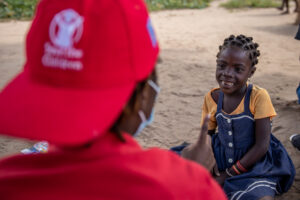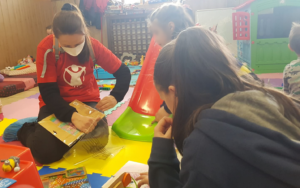How we support children’s mental health across the globe
Throughout the world, mental health is a concern for adults and children. In times of crisis, children can be exposed to horrific events, including death, severe injury, and torture, to name a few. Children under extreme stress or mental distress can show a variety of mental health and psychosocial problems, including aggression and withdrawal in their interactions with their communities and families.
Beyond the initial and immediate experiences a child may face, their mental distress can affect their long-term development. Long-term consequences can include adverse effects on their cognitive development and emotional regulation, resulting in life-long psychological and physical health problems.
Save the Children’s programs support the mental health and wellness of children. We provide programming worldwide to support children with appropriate tools and innovative techniques, like using art, play, and creativity as the starting point for healing and confronting difficult emotions.
How we support the mental health of families and children around the world
Connecting to tradition and culture in Canada

Save the Children’s National Reconciliation Program in Canada worked alongside local Indigenous partner De dwa da dehs nye>s Health Access Centre to provide virtual sessions with interactive support to pregnant women and families. The program included traditional and western health and maternal education, wellness resources, sharing circles, cultural arts programming, and workshops presented by community elders on topics including self-care and meditation. The program started during the height of the pandemic. At this time, many families and children faced challenges to their mental wellbeing due to social isolation, essential supply shortages, food insecurity, and an increase in personal and family stress. The project provided a culturally safe virtual space for families to remain safely connected in the community while still receiving necessary support.
Support through art and play in Mozambique

At only six years old, Clara* lost her father to horrific violence when he was attacked by armed men in Cabo Delgado, Mozambique. She hid for four days with her mother and younger brother before escaping to another village. No six-year old should have to experience such horror, which is sure to remain with her for a very long time. When Clara learned about her father’s death, she was distraught. Her mental distress prevented her from eating or playing with her friends.
Save the Children supported Clara with a Happy Kid Kit, including books, paper, and coloured pencils. Her mother enjoyed seeing Clara playing and happy, and beginning to process her past and look toward the future. Clara said, “The conflict is the hardest thing in my life. I like to draw because it makes me feel good and safe. I like to draw houses because I would like to live in a nice house where I can play with dolls.” Through art and imagination, Clara received mental health support that provided some healing to combat the trauma she had experienced.
Finding safety through play after fleeing Ukraine

Since February of 2022, the war in Ukraine has raged on, claiming many lives and displacing millions of children. Children have been forced to hide in bomb shelters, subways, and basements as blasts destroyed homes, schools, and communities. As families flee the horrific violence, children are at risk of displacement, physical harm, and severe emotional distress.
Save the Children has set up Child Friendly Spaces in many displacement areas for Ukrainian families fleeing violence. Here, children can play, socialize and relax with the help of trained and dedicated child protection experts. These spaces allow them to be children again while also giving them access to psychological support. One mother commented that the Child Friendly Space had been such a benefit to her child, “I am very happy that even in such a situation, my children are able to smile. This simply makes me happy.”
All children are resilient; however, sometimes, they need our help and support to process their experiences and emotions.
To support Save the Children’s work with children, click here.
*name changed to protect privacy


